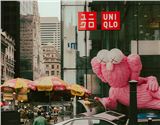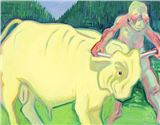Ode on a Grecian Urn
"Thou still unravish'd bride of quietness, Thou foster-child of silence and slow time" --John Keats
Edward Winkleman / Edward Winkleman
20 Sep, 2012

Thou foster-child of silence and slow time"
--John Keats
"The role of objects is to restore silence."
--Samuel Beckett
Tyler Green twice commented on a link that I put up on Facebook the other day pointing to a post Kyle Chayka had written on Hyperallergic about a post I had put up here. Tyler's first comment about the link was astutely humorous: "The meta, it hurts."
At the risk of making it hurt all the more, though, I'll quickly shift to Tyler's second, more challenging and equally astute comment: "If there has been growth in writing around art in recent years, it has been around art world meta-narratives, not about art objects, artists or the ideas artists pursue or examine in their work. Which is too bad."
There's no way to argue with any part of that observation, in my opinion. It's true, and it is too bad.
Mind you, I don't view it as my role on this blog to critique art. I'm not a critic, I own a gallery, and it's simply not appropriate, to my mind, for me to criticize shows in other people's galleries. There's no way to do so objectively and besides, again, I'm not an art critic. But I am an art viewer and, as such, an art criticism consumer, so I do feel it's appropriate for me to comment on art writing.
And so, I don't mind noting that I wouldn't mind reading more compelling reflections on art objects themselves. Not reviews of massive shows in which we get at most a pithy line or two about each work, but in-depth, inspiring, and perhaps most importantly accessible musings on single totally silencing objects. Silence today is highly underachieveable, unfortunately. We could all do with a far deal more of it.
But I don't long for lengthy exercises in art speak...I get my fill of that, quite frankly. Rarely do they drive me back to observe the actual object, again and again, but rather more often off to a dictionary and to read once-provocative texts that have haven't aged well. Such essays are too often vessels for their author's cleverness, and too often seemingly at best ambivalent about their subject.
Don't get me wrong, I fully understand that in the age of Photoshop, it's no longer as simple as
"Beauty is truth, truth beauty," - that is all
Ye know on earth, and all ye need to know."
But I do still find myself dumbstruck by art objects from time to time. I like that sensation. And I'd like to think I could (would) carve out the time in my schedule to read really good, in-depth, revealing critiques of why they silence us, still, these objects.
Then again, I wonder if a similar phenomenon isn't happening in the art world as political reporter Sasha Issenberg recently noted is happening in politics. Things are changing so rapidly the chroniclers of it all can't keep up, and so resort to the meta-narratives or non-applicable descriptions, leaving those closer to the subject being covered (those familiar with the actual objects) longing for more. From Issenberg's article in The New York Times:
Over the last decade, almost entirely out of view, campaigns have modernized their techniques in such a way that nearly every member of the political press now lacks the specialized expertise to interpret what’s going on. Campaign professionals have developed a new conceptual framework for understanding what moves votes. It’s as if restaurant critics remained oblivious to a generation’s worth of new chefs’ tools and techniques and persisted in describing every dish that came out of the kitchen as either “grilled” or “broiled.”
Indeed, in this time when there is so....much....art, and when an art critic from The New York Times confesses in a review, "I’m not sure if [new works by an established artist] completely qualify as art. But perhaps it’s not necessary," it indicates to me that perhaps we're seeing the impact of a similar modernizing development in the art world. Not so much that the art press lacks the specialized expertise to interpret what's going on (although I'd lay that charge at the feet of a few of them), as much as how quickly everything is changing, and how many individuals are making micro advances in new media with new rich, but insanely obscure histories, leads us to where critics and everyone else lack the perspective to see the whole picture in a way that enables clear interpretation, let alone much time to focus intensely on an individual object.
Still, it would be lovely...

 ARTISTS
ARTISTS






